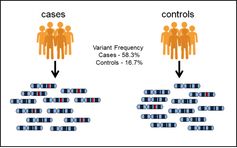|
By Ashley Nee, 22' Alzheimer’s disease (AD) devastates individuals and governments both emotionally and financially; the disease robs patients of their memory, and caring for AD and other dementias will cost the U.S. $277 billion this year alone. [1] Despite this, treatment options only slow its progression, giving rise to a push among some neurologists to emphasize lifestyle changes as preventive measures against AD. In a 2018 study by Dr. Emma Anderson and colleagues, the conversation regarding lifestyle changes as AD prevention is moved from diet and exercise to the centuries old debate of nature versus nurture – of education level versus baseline intelligence and whether or not one is protective against AD. [2]  It is well established that educational attainment is inversely correlated with AD, meaning individuals with greater education levels are less likely to develop AD. [2] However, it is unknown if this correlation is because naturally smarter individuals seek out more educational opportunities or because learning and education have protective effects against AD. In one study, Mendelian randomization, a technique that uses measured variations in genes of known function to assess the effect of these genes on a disease, was used to investigate this question. [2] To obtain data on genetic variations, Anderson and colleagues used two separate genome wide association studies (GWAS); the first analyzed intelligence, and the second analyzed educational attainment. GWAS are a form of observational study that use genetic variants of different individuals to determine if a specific genetic variant is associated with a trait. Variations in single base pairs of DNA, known as single nucleotide polymorphisms (SNPs), from analysis of the two aforementioned GWAS were either matched to educational attainment or intelligence. Anderson and colleagues then assessed the matched SNPs’ impact on AD development risk through analysis of another GWAS previously carried out by the International Genomics of Alzheimer’s Project. This analysis found that while educational attainment had no significant impact on AD risk, intelligence had a significant effect in lessening AD risk. Yet, the study also found a bidirectional relationship between education level and intelligence, suggesting that education may have a protective effect against AD. While the study has garnered praise from some, namely Dr. Eric Larson of the Kaiser Permanente, who described it as a “very sophisticated study with a really powerful approach” and confirmation of what “we’ve long suspected” to AlzForum, other neurologists, such as Dr. Deborah Blacker of Massachusetts General Hospital, remain skeptical and point out the potential inaccuracy of matching genetic variants with educational attainment through Mendelian Randomization. [3 - 4] This inaccuracy may arise from the fact that educational attainment is highly correlated with environmental factors, such as socioeconomic status and background, which are unable to be solely represented by genes. In either case, the research from the Anderson study remains preliminary and demands both replication and alternative approaches able to circumvent problems posed by Mendelian randomization. Despite the preliminary nature of this research, its potential impact on predictive determination of AD is enormous. Yet, its potential predictive power is burdened with ethical dilemmas. After all, such predictive testing could lead to genetic discrimination against individuals based on their baseline intelligence, educational attainment, and likelihood of developing AD, depending on the presence or lack of privacy regulations implemented in regard to this information. For the present, however, intelligence and education level remain interesting exploratory avenues for further AD research. Sources: 1. Preidt R. Alzheimer's costs Americans $277 billion a year -- and rising. CBS News. [Internet] 2018 March 20 [Cited 2018 October 15]. Available from: https://www.cbsnews.com/news/alzheimers-costs-americans-277-billion-a-year-report/ 2. Anderson EL, Howe LD, Wade KH, Ben-Shlomo Y, Hill WD, Deary IJ, Sanderson EC, et al. Education, intelligence and Alzheimer's disease: Evidence from a multivariable two-sample Mendelian randomization study [Internet]. 2018 [Cited 2018 October 16]. bioRxiv. September 19, 2018. DOI: 10.1101/401042 3. Larson E. Interviewed by: AlzForum. October 12, 2018 [Cited October 16, 2018]. 4. Blacker D. Interviewed by: AlzForum. October 12, 2018 [Cited October 16, 2018].
0 Comments
Leave a Reply. |
